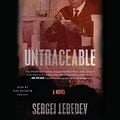A Dazzling Debut Spy Thriller Carved in Poison
Sergei Lebedev’s 'Untraceable' explores evil through the minds of both the hunter and the hunted
In Smiley’s People, the KGB assassinates a former Soviet general who spied for the British and is retired in London. John le Carré’s legendary spymaster George Smiley is brought back from retirement to assess the damage and sweep the mess under the proverbial carpet. But instead of a coverup, Smiley launches an operation that bags an enormous prize for …
Keep reading with a 7-day free trial
Subscribe to SpyTalk to keep reading this post and get 7 days of free access to the full post archives.



